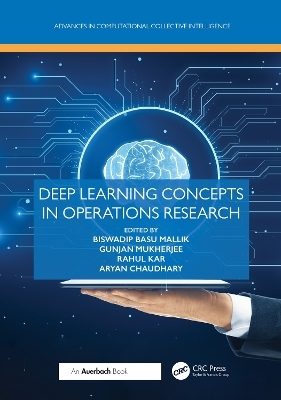
Deep Learning Concepts in Operations Research
Auerbach (Verlag)
978-1-032-55379-5 (ISBN)
- Noch nicht erschienen (ca. August 2025)
- Versandkostenfrei innerhalb Deutschlands
- Auch auf Rechnung
- Verfügbarkeit in der Filiale vor Ort prüfen
- Artikel merken
The model-based approach for carrying out classification and identification of tasks has led to the pervading progress of machine learning paradigm in diversified fields of technology. Deep Learning Concepts in Operations Research looks at the concepts that are the foundation of this model-based approach. Apart from the classification process, the machine learning (ML) model has become effective enough to predict future trends of any sort of phenomena. Such fields as object classification, speech recognition, and face detection have sought extensive application of artificial intelligence (AI) and machine learning as well. Among a variety of topics, the book examines:
An overview of applications and computing devices
Deep learning impacts in the field of AI
Deep learning as state-of-the-art approach to AI
Exploring deep learning architecture for cutting-edge AI solutions
Operations research is the branch of mathematics for performing so many operational tasks in other allied domains, and the book explains how the implementation of automated strategies in optimization and parameter selection can be carried out by AI and ML. Operations research has many beneficial aspects for decision making. Discussing how the proper decision depends on a number of factors, the book examines how AI and ML can be used to model equations and define constraints to solve more easily problems and discover proper and valid solutions. It also looks at how automation plays a significant role in minimizing human labor and thereby minimizes overall time and cost.
Biswadip Basu Mallik is a Senior Assistant Professor of Mathematics in the Department of Basic Sciences & Humanities at Institute of Engineering & Management, Kolkata, India. Gunjan Mukherjee is an Assistant professor in the Department of Computational Science, Brainware University, Barasat, India. Rahul Kar holds a master's degree in mathematics from Burdwan University and is currently working as a SACT-II Mathematics faculty of Kalyani Mahavidyalaya, Kalyani, Nadia, West Bengal. Aryan Chaudhary is the Chief Scientific Advisor at BioTech Sphere Research, India, and a recognized researcher of healthcare and technology.
1. Deep Learning: Overview, Applications and Computing Devices 2. Deep Learning Impacts in the Field of Artificial Intelligence 3. Deep Learning is a State-of-the-Art Approach to Artificial Intelligence 4. Unleashing the Power: Exploring Deep Learning Architecture for Cutting-Edge AI Solutions 5. Deep Learning for ECG Classification: Techniques, Applications, and Challenges 6. Social Distancing Detection System Using Single Shot Detection (SSD) and Neural Networks 7. Recognition of Voice and Speech Using NLP Techniques 8. Transfer Learning with Joint Fine-Tuning for Multimodal Sentiment Analysis 9. Machine Learning for Traffic Flow Prediction Addressing Congestion Challenges 10. Enhancing Autistic Spectrum Disorder Diagnosis Using ML Techniques: A Study on Deep Neural Network and Drop-out Deep Neural Network 11. Deep Learning: A State-of-the-Art Approach to Artificial Intelligence 12. An Approach through Different Mathematical Models to Enhance the Utility in Different Areas of Machine Learning 13. Study of Different Regression Methods, Models and Application in Deep Learning Paradigm 14. Deep Learning Impacts in the Field of Artificial Intelligence 15. Stock Prices Prediction of the FMCG Sector in NSE India: An Artificial Intelligence Approach 16. Multi-Attribute Decision Modelling 17. Regression Methods and Models 18. The Machine Learning Pipeline: Algorithms, Applications, and Managerial Implications 19. Role of Fertamean Neutrosophic Sets for Decision Making Modelling in Machine Learning 20. Performance Evaluation of Machine Learning Algorithms in the Field of Security-Malware Detection
| Erscheint lt. Verlag | 1.8.2025 |
|---|---|
| Reihe/Serie | Advances in Computational Collective Intelligence |
| Zusatzinfo | 30 Tables, black and white; 75 Line drawings, black and white; 75 Illustrations, black and white |
| Verlagsort | London |
| Sprache | englisch |
| Maße | 178 x 254 mm |
| Themenwelt | Technik ► Elektrotechnik / Energietechnik |
| Technik ► Umwelttechnik / Biotechnologie | |
| ISBN-10 | 1-032-55379-0 / 1032553790 |
| ISBN-13 | 978-1-032-55379-5 / 9781032553795 |
| Zustand | Neuware |
| Haben Sie eine Frage zum Produkt? |
aus dem Bereich


